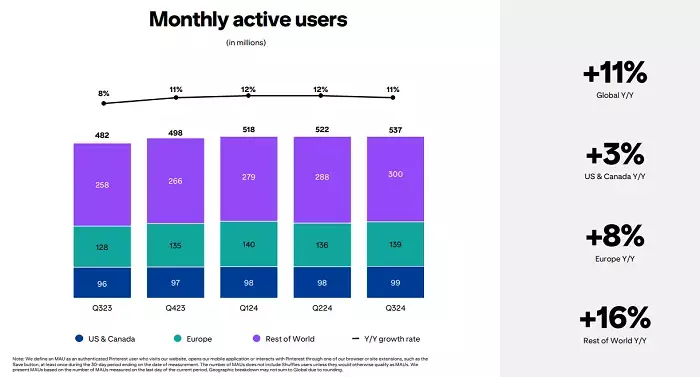Pinterest has unveiled a promising performance update, showcasing significant growth in both revenue and user engagement. This signals a strategic advantage as the platform gears up for the impending holiday shopping influx. The latest statistics reveal that Pinterest has successfully onboarded an additional 15 million monthly active users (MAUs) in the third quarter, propelling its total to 537 million. This marks a notable acceleration in user growth compared to the mere 4 million added in the previous quarter. While 4 million new users is still commendable in the landscape of social media, the spike to 15 million reflects a healthier upward trajectory for Pinterest’s user base. Such trends are crucial as they paint a broader picture of evolving user engagement on the platform.
The recent surge in active users is not just a statistic; it indicates a turning tide for Pinterest following a tumultuous period. During the onset of the COVID-19 pandemic, skyrocketing engagement figures led many to speculate that user behavior had irrevocably shifted towards online shopping. However, the reopening of physical stores resulted in decreased traffic on Pinterest, revealing vulnerabilities in its user retention strategies. Thankfully, the platform has clawed its way back to new highs, establishing a more robust foundation for long-term success. This rebound symbolizes a critical achievement for Pinterest, showcasing its ability to navigate market fluctuations.
Despite the figures being optimistic, the stagnation of growth in critical markets such as the U.S. and the European Union raises pertinent concerns. These regions play a significant role in Pinterest’s revenue generation, and the lack of expansion in user outreach may hinder its advertising potential. While the company is witnessing growth in other territories, the emphasis remains on maximizing revenues from established markets. Many social platforms are approaching saturation in Western markets, which adds complexity to Pinterest’s growth strategy, urging the need for innovative ad solutions that might risk discontent among users if improperly managed.
Pinterest’s revenue for the quarter clocked in at $898 million, reflecting an impressive 18% year-over-year increase. This growth narrative becomes even more compelling when considering the anticipated bustling sales in Q4. By leveraging insights based on retail performance from the previous year, expectations are high for a strong finish in 2024. Pinterest’s ongoing enhancements in shopping features and its commitment to refining digital tools are presumably contributing to a burgeoning user interest, affirming its identity as an evolving e-commerce ecosystem.
This year, Pinterest has launched various AI-driven features such as the “Body Type Filters,” designed to personalize user experiences by promoting products catering more closely to individual needs. Moreover, the incorporation of AI into ad creation enhances marketers’ ability to align their content with distinct trends in user engagement. However, the push towards technological advancement does not come without a cost. Pinterest’s research and development expenditures have surged close to 25%, highlighting the balance that the company must maintain between investment and profitability. This necessity for innovation parallels the larger trend of substantial financial commitments being made by fellow platforms in the AI sector.
What Lies Ahead: A Bright but Challenging Path
Pinterest’s strength lies in its unique offering: the ability to create a visually appealing and user-centric marketplace that stands out from traditional e-commerce platforms. By providing a dynamic visual experience that facilitates product discovery, Pinterest enhances the way brands engage with consumers. For continued progress, the key will be to harmonize ad opportunities across various global markets while not losing sight of user-centric innovations. As Pinterest judiciously embarks on this journey, the importance of sticking to its core mission will remain paramount. The platform has demonstrated resilience and adaptability, propelling it toward a promising future with increasing engagement levels and revenue potential.
While Pinterest’s recent statistics and innovations speak volumes regarding its potential, the road ahead demands careful navigation through market challenges, user experience optimization, and sustainable ad solutions. If it can strike this balance, Pinterest could solidify its position as a vital player in the social media and e-commerce landscape.

